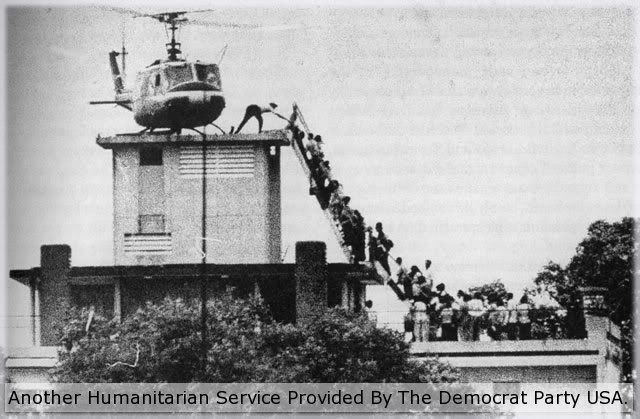To: ChessExpert
2 posted on
08/23/2007 6:48:07 PM PDT by
rawcatslyentist
(“Seize them and put them to death wherever you find them.” (Sura 4:89) Our New strategy in the WOT)
To: rawcatslyentist
6 posted on
08/23/2007 7:03:26 PM PDT by
dodger
To: rawcatslyentist
The text, audio, and video of President Bush's speech is available here:
http://www.whitehouse.gov/news/releases/2007/08/20070822-3.html#
President Bush gives excellent speeches. He is a lot smarter than his critics. He could be more aggressive. For example, he puts the communist murders in Cambodia at hundreds of thousands, when it was more like two million. He could have blamed the Democratic Congress for abandoning Vietnam and Cambodia, and blamed them for the subsequent bloodbath.
Here's an excerpt:
Finally, there's Vietnam. This is a complex and painful subject for many Americans. The tragedy of Vietnam is too large to be contained in one speech. So I'm going to limit myself to one argument that has particular significance today. Then as now, people argued the real problem was America's presence and that if we would just withdraw, the killing would end.
The argument that America's presence in Indochina was dangerous had a long pedigree. In 1955, long before the United States had entered the war, Graham Greene wrote a novel called, "The Quiet American." It was set in Saigon, and the main character was a young government agent named Alden Pyle. He was a symbol of American purpose and patriotism -- and dangerous naivete. Another character describes Alden this way: "I never knew a man who had better motives for all the trouble he caused."
After America entered the Vietnam War, the Graham Greene argument gathered some steam. As a matter of fact, many argued that if we pulled out there would be no consequences for the Vietnamese people.
In 1972, one antiwar senator put it this way: "What earthly difference does it make to nomadic tribes or uneducated subsistence farmers in Vietnam or Cambodia or Laos, whether they have a military dictator, a royal prince or a socialist commissar in some distant capital that they've never seen and may never heard of?" A columnist for The New York Times wrote in a similar vein in 1975, just as Cambodia and Vietnam were falling to the communists: "It's difficult to imagine," he said, "how their lives could be anything but better with the Americans gone." A headline on that story, date Phnom Penh, summed up the argument: "Indochina without Americans: For Most a Better Life."
The world would learn just how costly these misimpressions would be. In Cambodia, the Khmer Rouge began a murderous rule in which hundreds of thousands of Cambodians died by starvation and torture and execution. In Vietnam, former allies of the United States and government workers and intellectuals and businessmen were sent off to prison camps, where tens of thousands perished. Hundreds of thousands more fled the country on rickety boats, many of them going to their graves in the South China Sea.
Three decades later, there is a legitimate debate about how we got into the Vietnam War and how we left. There's no debate in my mind that the veterans from Vietnam deserve the high praise of the United States of America. (Applause.) Whatever your position is on that debate, one unmistakable legacy of Vietnam is that the price of America's withdrawal was paid by millions of innocent citizens whose agonies would add to our vocabulary new terms like "boat people," "re-education camps," and "killing fields."
There was another price to our withdrawal from Vietnam, and we can hear it in the words of the enemy we face in today's struggle -- those who came to our soil and killed thousands of citizens on September the 11th, 2001. In an interview with a Pakistani newspaper after the 9/11 attacks, Osama bin Laden declared that "the American people had risen against their government's war in Vietnam. And they must do the same today."
His number two man, Zawahiri, has also invoked Vietnam. In a letter to al Qaeda's chief of operations in Iraq, Zawahiri pointed to "the aftermath of the collapse of the American power in Vietnam and how they ran and left their agents."
Zawahiri later returned to this theme, declaring that the Americans "know better than others that there is no hope in victory. The Vietnam specter is closing every outlet." Here at home, some can argue our withdrawal from Vietnam carried no price to American credibility -- but the terrorists see it differently.
15 posted on
08/23/2007 7:24:09 PM PDT by
ChessExpert
(Reagan dismantled the Russian empire of 21 conquered nations)
To: rawcatslyentist
A perfect example of democrat redeployment.
21 posted on
08/23/2007 10:11:04 PM PDT by
Maynerd
(Bush is trying to sell a "War on Terror" against a "Religion of Peace." Confusing isn't it?)
FreeRepublic.com is powered by software copyright 2000-2008 John Robinson

